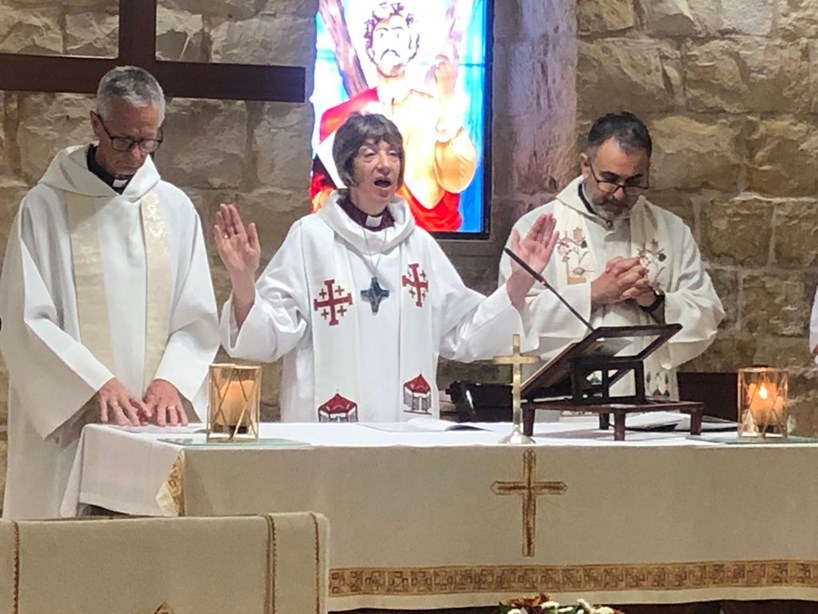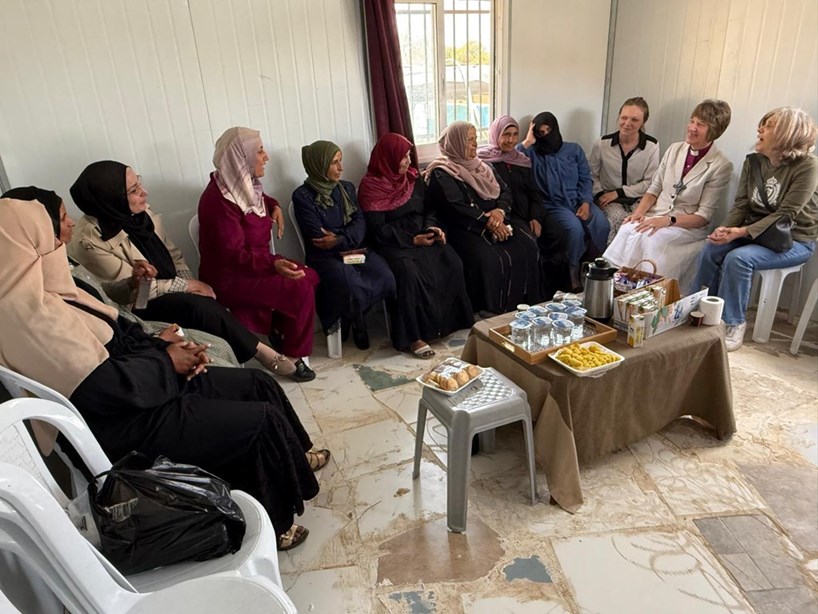AS THE world watches the unfolding humanitarian disaster in Gaza, violence in the occupied West Bank is increasing, and should not be overlooked, the Bishop of Gloucester, the Rt Revd Rachel Treweek, said after her visit to the region last weekend.
Her position was not about being “pro-Palestine” or “anti-Israel”, she told the Church Times on Monday. “What I’m saying is that every person should have liberty and equal dignity, and this is not what we’re seeing in the occupied Palestinian territories. All the power sits with Israel, and the Palestinian people have no way to defend themselves.”
Her trip began on Friday 23 May, a day after the House of Bishops issued a statement condemning the bombardment of Gaza as a “grave sin” and a “war of aggression” (News, 30 May).
The statement was the strongest that the Bishops have issued, and Bishop Treweek said that it had been appreciated by those whom she met during her five-day trip to east Jerusalem and the occupied West Bank.
“There was a feeling that some of the statements we’d issued at the beginning didn’t say very much at all, and they felt really let down by those,” she said (News, 27 October 2023). The most recent could have gone even further, Bishop Treweek suggested; but it was important to have something around which all the bishops could coalesce.
Asked what had changed to prompt the stronger stand, she mentioned the feedback given to the House from the four bishops who had made frequent visits to Jerusalem and the West Bank since the attacks on 7 October 2023 and the subsequent bombardment of Gaza.
“Speaking for myself, I have come back even more resolved to be speaking both into the Church and speaking into Parliament. I want to be encouraging Christians to be speaking loudly about sanctions, about stopping the sale of arms,” she said.
Another factor in provoking the stronger statement was the UK Government’s joint statement with France and Canada on 19 May. The House of Bishops wanted to “get behind that”, she suggested.
The joint statement by the UK, France, and Canada included a condemnation of “any attempt to expand settlements in the West Bank”, and suggested that “targeted sanctions” could follow if Israel did not halt the spread of illegal settlements.
 Church of EnglandThe Bishop of Gloucester, the Rt Revd Rachel Treweek, at a service in Ramallah, in the West Bank
Church of EnglandThe Bishop of Gloucester, the Rt Revd Rachel Treweek, at a service in Ramallah, in the West Bank
On Thursday of last week, the Israeli government announced the creation of 22 new settlements, which are illegal under international law. The Finance Minister, Bezalel Smotrich, who is the leader of the National Religious Party-Religious Zionism party, said that it was a “strategic move that prevents the establishment of a Palestinian state that would endanger Israel”.
Bishop Treweek said on Monday that one of the practical, long-term steps that could be taken towards peace in the Middle East was for the world to recognise Palestinian statehood. What was happening in the West Bank, as well as in Gaza, was “about dispossession of land and identities, a violation by Israel of the right of the Palestinian people to self-determination, to be recognised as a state”, she said.
This was an issue on which Bishop Treweek had spoken in the House of Lords (News, 21 March) and such interventions were appreciated by Christians in the occupied territories, she said on Monday.
Settler violence in the West Bank has escalated since 7 October 2023, according to media reports and non-government organisations. Bishop Treweek said that she had seen the outcome of such violence first-hand while visiting a family who had been attacked by settlers during her recent trip.
“The father had just had his leg amputated after he’d been shot in the leg by settlers, and we actually saw the footage, because his 16-year-old son had filmed the settler invasion of the land.”
When some Israeli soldiers arrived, the boy and his wounded father were both arrested. The father had passed out, and woke up the next day in an Israeli hospital, his wounded leg amputated, and his remaining limbs tied to the bed, Bishop Treweek said.
Thanks to the video footage, charges against the man and his son were dropped, but others who have complained that their land was being attacked have been punished by the law.
Bishop Treweek said that a meeting with women who were engaged in an empowerment programme run by the YMCA was in equal parts depressing and heartening. “What was sad for me was they’d done all this really proactive, innovative stuff, improving electricity and water supplies and getting their children to school; but, in recent weeks, that’s all moved to questions such as ‘How do we get bars on our windows, and fire extinguishers?’, because the settler activity has become so aggressive.”
Palestinians living in the occupied territories, who include a small Christian minority, faced intense pressure to leave, due to settler activity, the use of checkpoints to restrict movement, and land rights being violated, she said.
 Church of EnglandThe Bishop of Gloucester, the Rt Revd Rachel Treweek, meeting women in the West Bank
Church of EnglandThe Bishop of Gloucester, the Rt Revd Rachel Treweek, meeting women in the West Bank
It was impossible to encourage people to remain in such difficult circumstances, but “what I did in each situation was to thank people for their presence,” she said. “I think one of the powerful things in our visit is not just about what we might bring back and say, but it’s about being present there with people, and saying to people: ‘I have seen you, I have heard you, I’m accountable to you.’”
On Monday, Bishop Treweek paid particular tribute to the work of the Dean of St George’s College in Jerusalem, Canon Richard Sewell, who had been instrumental in organising episcopal visits to Jerusalem and the West Bank.
Two weeks ago, Canon Sewell began fasting for 24 hours on Wednesdays, to draw attention to critical food shortages in Gaza. On Wednesday this week, he wrote on social media about a recent visit to the Church of the Multiplication of the Fish and the Loaves, Tabgha, on the shore of the Sea of Galilee.
“I prayed for what seems like a contemporary miracle: that the mountain of available food outside Gaza would be permitted to get to starving people inside Gaza. In fact it wouldn’t be a miracle it would simply be the right and humane thing to do. But the world’s leaders won’t act decisively towards this end, so starvation continues and gets worse,” he wrote.
On Thursday, the American Friends Service Committee published a new report on the situation in the Occupied Palestinian Territories of Gaza, east Jerusalem, and the West Bank.
The report by the Quaker organisation highlights ever-increasing impediments to movement around the West Bank by Palestinians, and the demolition of homes. Humanitarian routes into Gaza are not functioning, the report warns, owing to Israeli military action.
Aid distribution centres in Gaza were closed on Wednesday, as Israeli authorities had classified roads leading to the sites as “combat zones”, BBC News reported.
On Tuesday, health officials in Gaza said that at least 27 Palestinians had been killed by Israeli fire while attempting to collect aid packages.
Bishop Treweek said on Monday that she found it “quite shocking” that a diocesan-synod motion relating to Israel brought by the diocese of Carlisle had not been chosen as an item of business for the General Synod in York.
The motion calls on the Church’s investment bodies to review their policies, and to ensure that there is no investment in “any entity or corporation with a persistent, on-going, and direct business involvement in severe human rights violations or violations of international law as part of Israel’s military occupation”.
















